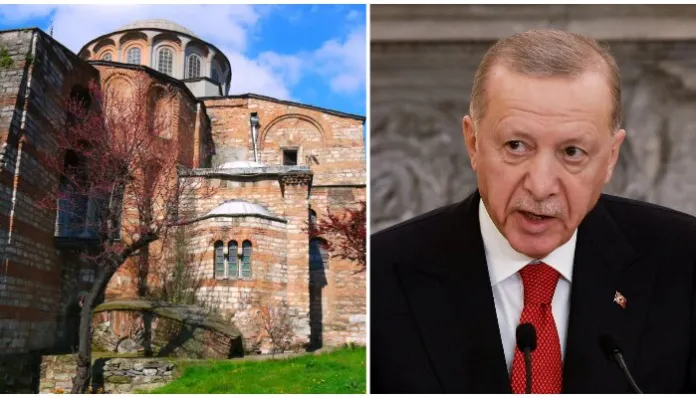In a significant development, the iconic 4th-century AD Byzantine Chora Church, located in Istanbul, Turkey, is set to undergo conversion into a mosque by the administration of President Recep Tayyip Erdogan. This conversion is scheduled to be completed by May of this year, allowing Muslims to offer Namaz within its walls. The announcement came from the General Directorate of Foundations, stating that worship activities are slated to commence in May 2024, following four years of extensive restoration efforts. Contrary to earlier claims, the first Muslim prayer event will not take place on February 23rd.
This transformation marks a series of changes in the usage of the historical site. Originally constructed in the 4th century, the Chora Church served as a Christian church until the 15th century. Subsequently, it was converted into a mosque in 1511, during the Ottoman Empire’s reign. However, with the advent of the liberal era in Turkey post-World War II, the structure was repurposed as a museum in 1945. President Erdogan’s administration announced plans to convert it into a mosque in 2020, leading to ongoing restoration work.
Similarly, the renowned Hagia Sophia Church underwent a comparable transition under Erdogan’s government in 2020. Initially built as a church, it was converted into a mosque in 1453, then into a museum in 1935, and finally reconverted into a mosque in 2020. Notably, a section of Hagia Sophia has recently been reopened as a museum for public visitation.
The decision to convert the Chora Church into a mosque follows closely on the heels of the Hagia Sophia transformation. Considered one of the earliest religious structures of the Byzantine Empire and Eastern Orthodox Christianity, the Chora Church dates back to the early 4th century. Originally established as a monastery complex outside Constantinople’s city walls by Emperor Constantine the Great, it boasts exquisite Byzantine frescoes and mosaics adorning its interiors.
Throughout its rich history, the Chora Church has undergone several renovations and reconstructions. Notably, in the 14th century, it was extensively refurbished by Isaac Comnenus, culminating in the completion of its intricate decorations by 1321. Recognised for its cultural significance, the church is listed as a UNESCO World Heritage Site.
However, with the transition from the Byzantine to the Ottoman era, the church was repurposed as a mosque in 1511, leading to the covering of its iconic mosaics and frescoes with plaster due to Islamic prohibitions against iconic imagery. This status persisted for 434 years until 1945, when it was transformed into a museum following the collapse of the Ottoman Empire, known as the Kariye Museum.
In 2005, a legal challenge was mounted against the museum status of the Chora Church, resulting in a court order from Turkey’s highest administrative body, the Council of State, in 2019, mandating its reconversion into a mosque. Subsequently, President Erdogan’s government issued an order in August 2020, officially designating it as a mosque. The first Muslim prayers in 72 years were held at the Chora Church on October 30, 2020, before renovation work commenced.
President Erdogan’s advocacy for the return of Turkey to its Khilafat era, aiming to position himself as a global leader of Muslims, has drawn attention to these conversions. While these decisions have sparked controversy internationally, within Turkey, they have not faced significant opposition from either Muslim organisations or liberal groups. Despite assertions from certain quarters within Islam regarding the construction of mosques atop other places of worship, these decisions have proceeded without substantial dissent.
In contrast, the construction of the Ram Mandir in India following a Supreme Court verdict faced extensive scrutiny and debate, despite historical evidence supporting its location on the site of a demolished ancient temple. The lack of comparable opposition in Turkey highlights the unique socio-political dynamics surrounding religious conversions and cultural heritage in the region.




















Comments